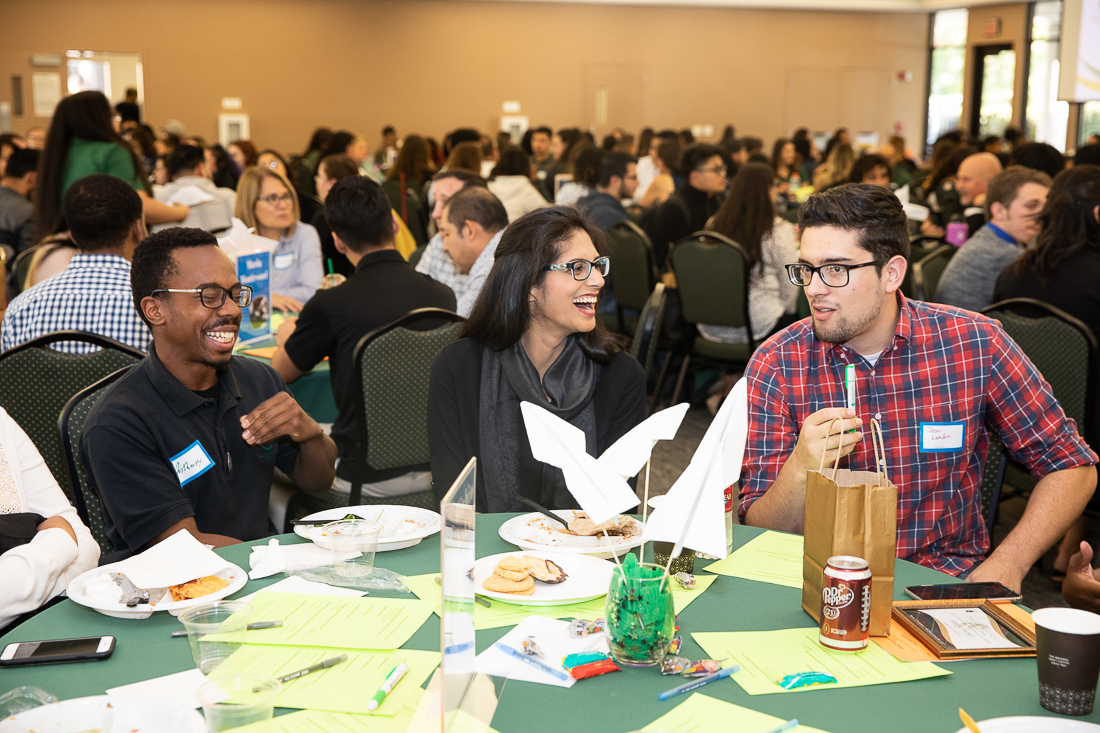 During the Celebration of Teaching event on Oct. 26, students spoke with instructors, who touted the profession's virtues and opportunities. (Sacramento State/Andrea Price)
During the Celebration of Teaching event on Oct. 26, students spoke with instructors, who touted the profession's virtues and opportunities. (Sacramento State/Andrea Price)By Jonathan Morales
In early October, Elinore Loyer received a mysterious email.
One of her professors – she doesn’t know who – submitted her name as someone who would make a good teacher. The email was an invitation to an event where Loyer could learn more.
“I trust my professors to an extent, so I decided I’ll go, see what it is, how I feel,” said Loyer, a sophomore majoring in Biology and who plans to become a pediatrician. “I will actually consider this. I’m not going to just ignore it.”
Loyer was one of more than 200 students who participated in the fourth annual Celebration of Teaching on Oct. 26. Put on by the College of Education and its Educational Equity Program, the event is part of the California State University’s EduCorps initiative to increase the number and diversity of teachers. It’s designed to introduce the teaching profession to students who might not have previously considered it. To that end, students are nominated from across all majors, not just from the College of Education.
“There are so many students who are studying all the vast, different degree programs we have here, and those people are needed in classrooms, too,” said Deidre Sessoms, chair of the Teaching Credentials Department.
“We need people who can think creatively about problems, who understand psychology or economics or engineering.”
Faculty members are encouraged, in particular, to nominate students of color. That’s because California’s teachers – and Sacramento State’s credential students – do not reflect the diversity of the state’s K-12 students or even the University’s overall student population. Reversing that trend, said Professor of Education Mae Chaplin, is a crucial factor for improving educational outcomes as well as continuing to develop a diverse workforce.
“If students see themselves as a teacher, because their teacher looks like them, has a similar background as them, then they themselves might be more likely to consider teaching as a career,” said Chaplin, one of the event’s original organizers.
Sacramento State was among the first in the CSU system to implement the EduCorps initiative, and the Celebration of Teaching event is considered a model for other such events, Chaplin said.
The event began with remarks from President Robert S. Nelsen, who shared his journey from would-be politician and Western clothes salesman to teacher.
“I learned that teaching is a sacred profession, and I learned that teaching is one of the most rewarding professions you can have,” Nelsen said. “It’s a crazy world out there. Who is going to save that world? Teachers.”
Participants then broke into small groups, where they had the opportunity to hear from and ask questions of current K-12 teachers and Sacramento State faculty. They were also introduced to the various advising and financial aid programs available to teacher candidates, and the event wrapped up with a panel discussion.
Anna Quitter, a sophomore History/pre-credential major, has known for some time she wanted to be a teacher. But attending the Celebration of Teaching was still beneficial, she said, because it helped clarify her path to a credential and connect her with like-minded students.
“Being able to be in that community and say, ‘Yes, we like teaching, and we love history, and we’re passionate about it. We want to teach it to new generations’ – that sense of camaraderie and community has been good,” Quitter said.
Organizers are gathering data to determine how many of the roughly 800 students who have attended over the past four years have ultimately entered credential programs at Sacramento State or elsewhere. But Chaplin says even anecdotal stories, such as a former student who had completed a master’s degree in another field before deciding to become a teacher after Chaplin nominated, are powerful.
“At a small level, it’s a reward to see that, because I know the student will be able to go on and do good things in terms of teaching,” she said. “That’s always my long-term goal. Are we preparing teachers who will meet the needs of the community?”
